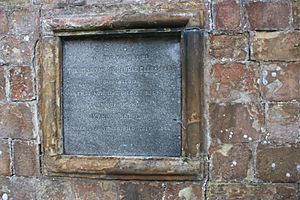Sir George Clerk, 6th Baronet facts for kids
Quick facts for kids
Sir George Clerk
|
|
|---|---|
| Vice-President of the Board of Trade | |
| In office 5 February 1845 – 29 June 1846 |
|
| Monarch | Victoria |
| Prime Minister | Sir Robert Peel, Bt |
| Preceded by | The Earl of Dalhousie |
| Succeeded by | Thomas Milner Gibson |
| Personal details | |
| Born | 19 November 1787 |
| Died | December 23, 1867 (aged 80) Penicuik House, Midlothian |
| Citizenship | United Kingdom |
| Nationality | Scottish |
| Political party | Tory |

Sir George Clerk of Pennycuik, 6th Baronet (born November 19, 1787 – died December 23, 1867) was an important Scottish politician. He was a member of the Tory political party. He served as a Member of Parliament (MP) for several areas in the United Kingdom. Being a Baronet meant he held a special hereditary title.
Contents
Sir George Clerk: A Life in Politics
Early Life and Education
George Clerk was born near Edinburgh, Scotland. His father was Captain James Clerk. George went to the High School in Edinburgh. Later, he studied at the University of Oxford. He earned a degree there in 1810.
Serving in Parliament
Sir George Clerk was a Member of Parliament (MP) for many years. An MP is a person elected to represent a group of people in the country's government. He represented Edinburghshire from 1811 to 1832. He was also an MP for Edinburghshire again from 1835 to 1837.
Later, he represented Stamford from 1838 to 1847. His last time as an MP was for Dover from 1847 to 1852.
Important Roles and Contributions
Sir George held many important jobs in the government. From 1819 to 1830, he was a Lord of the Admiralty. This role involved helping to manage the British Navy. He also worked as an Under-Secretary of State for the Home Department in 1830.
He was a Parliamentary Secretary to the Treasury from 1834 to 1835. From 1841 to 1845, he was the Financial Secretary to the Treasury. This job meant he helped manage the country's money.
In 1845, he became a member of the Privy Council. This is a group of important advisors to the King or Queen. He was also made Vice-President of the Board of Trade. This role helped with trade and business in the country. At the same time, he was the Master of the Mint, in charge of making coins. He held these jobs until 1846.
Beyond Politics: Other Interests
Sir George Clerk was interested in more than just politics. He was the President of the Zoological Society from 1862 to 1867. This society works to protect animals. He was also the Chairman of the Royal Academy of Music. This academy teaches music.
In 1812, he became a Fellow of the Royal Society of Edinburgh. This is an honor given to people who have done important work in science or other fields. He also became a Fellow of the Royal Society of London in 1819.
Family Connections
In 1810, Sir George married Maria Anne Law. Her father was Ewan Law, who was also an MP.
Sir George had a brother named John Clerk-Maxwell. John was the father of a very famous scientist, James Clerk-Maxwell. James Clerk-Maxwell made important discoveries about electricity and magnetism.
Later Years and Legacy
Sir George Clerk passed away in December 1867. He was 80 years old. He died at Penycuik House in Midlothian, Scotland. He is buried in the churchyard of St. Mungo's Church in Penicuik. His wife is buried there with him.
 | Precious Adams |
 | Lauren Anderson |
 | Janet Collins |

